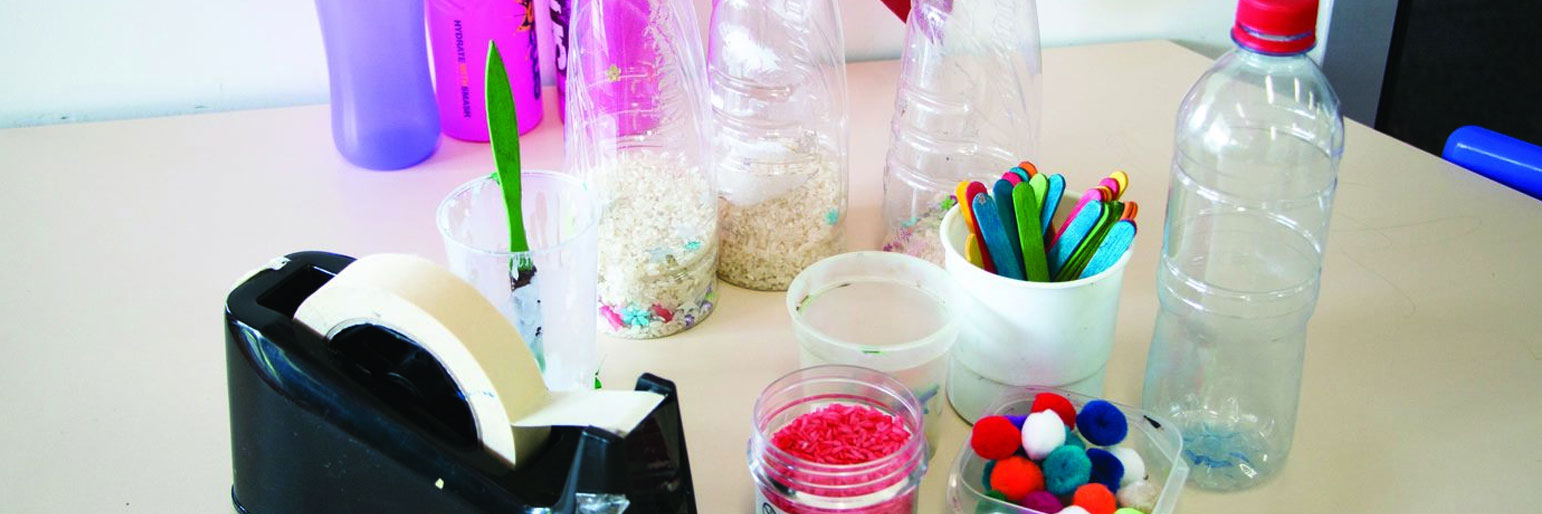Making musical instruments
Singing together
Music and singing helps children’s brains to develop through numeracy and literacy skills and inspiring creativity and imagination.
Activity
Make your own playgroup orchestra! Parents/carers and children use creativity and imagination to make a variety of musical instruments using recycled and everyday materials. Kitchen items, such as saucepans and large mixing bowls, make fantastic drums. Children can use a wooden spoon or their hands to make music. Two saucepan lids make a great pair of cymbals.
Recycled plastic bottles, small boxes, or little yoghurt containers can be turned into shakers. Just put something small inside that will make a sound. Try using rice, dried chickpeas or little stones. Allow children to make choices about what container to use and what to put in it. Tape the lids shut and shake. Let them experiment with different materials and quantities.
What you'll need
- Boxes
- Cardboard
- Textas
- Scissors
- Collage material such as streamers, sticky dots or patty pans to decorate instruments
- Wooden spoon
- Small containers
- Wooden sticks
- Funnels
- Plastic containers
- Tape
- Saucepans, pots and pans
- Beans, rice, seeds, sand and stones
- Tin cans
- Rubber bands
Words to use
- Drum, beat, pound
- Loud/soft, louder/softer, quiet
- Shake, music shaker, maracas
- Crash, bang, chime, tinkle
- Ding, ring, ting
- Tape, container, tin can
- Beans, rice, chickpea
Questions to discuss
- Where should we hang the tin can? Can you reach it there?
- Let’s count out 20 chickpeas. Do you think that will be enough?
- Which instrument is the loudest? Which is the quietest? Can you change the sound of your instrument?
Learning through play
Ways to develop numeracy through play
- Talk about quantities as you add grains to your shakers eg add¼ cup of rice.
- Talk about different sizes of bowls or saucepans – which one is the biggest/smallest?
- Fill glass jars or bottles with water to different heights and colours. Gently tap them with a spoon.
- Sort construction materials and group different instruments.
- Tap out a beat or pattern by counting out loud.
Ways to develop literacy through play
- Try playing loud/soft or fast/slow.
- Play your shaker up high/down low or from side to side.
- Use a tissue box or shoebox to make a guitar by stretching rubber bands across the opening. Use words such a strum, pluck and pick.
- Use your instruments to sing familiar songs.
- Name different instruments – sing I am a Fine Musician.
Extensions and variations to this activity
- Decorate the shakers or tin cans, use paint, paper, glitter or bits of fabric.
- Make a stage to perform.
- Make a musical garden by hanging up tin cans, pans or lids for children to bash with spoons.
- Invite someone to play an instrument live at playgroup.
- Form a marching band and march around playgroup inside or outside.
- Staple or tape paper plates together with rice inside to make a maraca – add streamers for extra colour and movement.
- Listen to different instruments being played and guess what each one is.
- Sing Old McDonald had an Orchestra.
- Read The Musicians of Bremen.
Supporting parent engagement in play
Play prompts:
Use your imagination to make some instruments with your child using the different materials provided. Use words like bang, beat, music, instrument, guitar, drumstick, rhythm, shake up and down. Ask questions, like:
- Which container shall we use for our shaker?
- What should we put inside it?
Parents or carers can:
- Comment on what their children are doing (say what they see).
- Sing in their home language.
- Use literacy and numeracy words (see words to use section above).
- Help their child to make an instrument.
- Assist them where necessary with cutting, gluing or taping.
- Play instruments with their child.
- Sing familiar songs and play along with their instruments.
You can help families by:
- Modelling what you want them to do.
- Talking to them about the focus of the activity and what children might be learning.
- Writing up words that go with the activity.
- Making suggestions on what families can do at home.
Related Great Start activities
Great Start activities are for parents and carers to do with their children.


